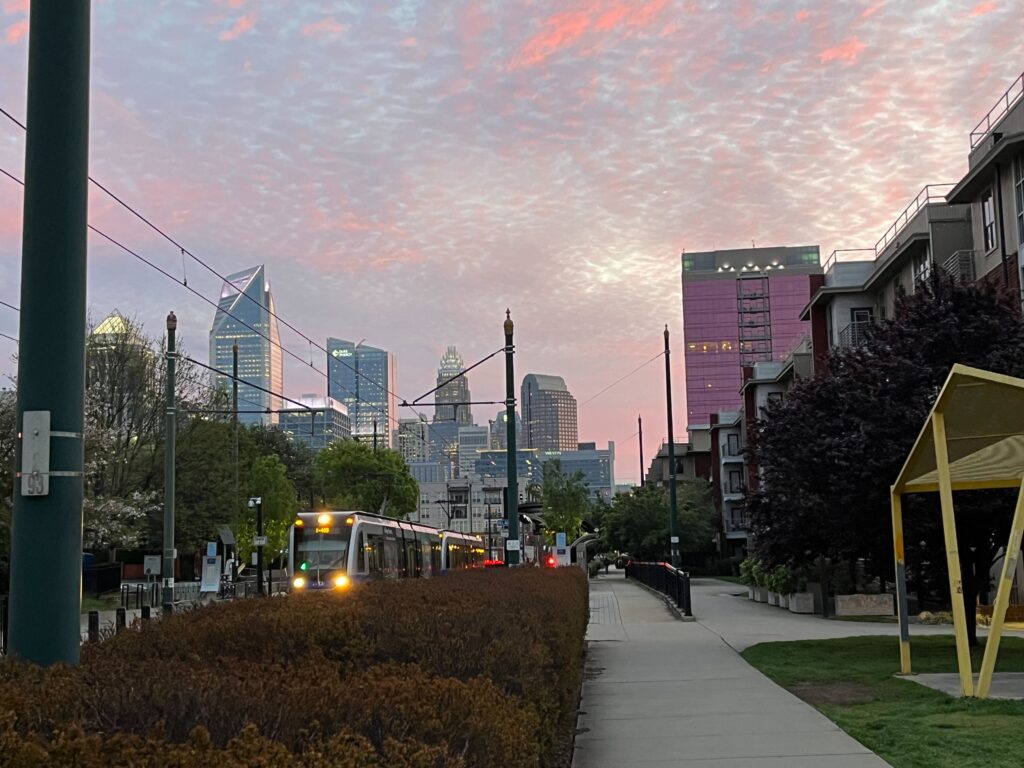Transportation, Planning and Development Committee: The latest

Photo: Hope Wright
On Monday, May 1, the Transportation, Planning, and Development (TP&D) Committee held their monthly meeting. While CATS has made a number of high-profile headlines over the past couple of months, this meeting was remarkably routine. City Manager Marcus Jones and interim CATS CEO Brent Cagle joined the committee members to share updates and answer questions. The meeting wrapped up with an update on rezonings as we approach the June 1 UDO implementation date. Here’s a recap of some of the highlights.
CATS Update
Much of the meeting was spent revisiting the steps that CATS is taking to address a slew of issues. Jones shared that the City is following a 5-step plan that includes forming an ad hoc committee and delaying the search for a new CATS CEO. Read more about it in our April TP&D meeting blog.
The ad hoc committee, consisting of Cagle and council members Ed Driggs, Tariq Bokhari, Dante Anderson, and Braxton Winston, has already met twice and conducted an informal risk management plan for the department. At the last Metropolitan Transit Commission (MTC) meeting, members expressed a desire to have a representative on the ad hoc committee. It is unclear if someone has been added at this time. They have also recommended that a public dashboard be created to house all real-time updates on the work at CATS as the NCDOT-approved corrective action plans move forward. Proposed milestones for the dashboard will be shared at next month’s meeting.
For more on the corrective action plans and NCDOT involvement, check out these articles by WFAE, the Charlotte Post, and Sustain Charlotte recapping the April 26 MTC meeting.
Cagle then gave an update on missed bus trips. In August 2022, CATS reduced bus service levels because they lacked the necessary 40 operators to run certain routes. At that time, up to 10% of trips were missed. Now, only 1%-2% of overall trips are missed, but the numbers are steadily creeping back up as operators are taking unplanned absences, particularly on the weekends. Up to 20% of trips are currently missed on Saturdays and Sundays. Cagle acknowledged that this is unacceptable and assured committee members that CATS is in conversation with RATP Dev (the management company contracted by CATS) to reduce unplanned absences. However,Cagle cautioned that if these trends continue into November, CATS will likely have to reduce service yet again.
Council member Malcolm Graham stressed that regional cooperation and participation will be critical to CATS’ future and asked for an update on the requested Federal Transit Administration (FTA) off-cycle review of the department. Cagle confirmed that the FTA intends to complete the review but has not yet sent a full scope of work and timeline. The FTA is going through their own internal procurement process to secure an outside consultant to conduct the review before sending these materials. Graham encouraged everyone to “keep the main thing the main thing,” by which he meant getting people to work on time.
Here’s our take
We appreciate Graham’s focus on regional cooperation and getting the basics right. In order to move the City’s ambitious mobility plans forward, we need an equally ambitious champion. We are calling on council members to work with leaders across the region to form a strong, passionate group of mobility advocates who will spearhead the One Cent for Mobility sales tax proposal in Raleigh. The longer we kick this can down the road, the more likely we are to default on the incredible plans our region has put together to provide mobility options for all residents.
Rezoning update
During the last portion of the meeting, Rezoning Program Manager Dave Pettine presented several options to retool the current rezoning process, chiefly strategies to improve information sharing. A few strategies include monthly updates to the Charlotte City Council and the Mecklenburg County Board of County Commissioners, establishing rezoning service areas by council district, and launching an app that will map all development and proposed development in the county. We are particularly excited about the mapping app as it will allow elected officials and the public to easily identify and visualize how future development could occur in Charlotte’s neighborhoods.
Pettine confirmed that Policy Map refinements will continue throughout the Community Area Planning (CAP) process, which is expected to wrap up in early 2024. The updated 2024 Policy Map will include companion guidance for map amendment criteria. In the meantime, the rezoning team will work closely with TP&D members on strategies to handle Policy Map inconsistencies.
You can influence how your neighborhood is planned and developed by attending a Community Area Planning workshop, attending in-person drop-in office hours with Planning staff, or giving input on the online map exercises. Sign up and get involved here!
Thanks for reading!
As a nonprofit, community support is essential for us to keep doing what we do — including providing free articles like this. If you found this article helpful, please consider supporting Sustain Charlotte.
Want to stay in the loop? Subscribe to our weekly newsletter and follow us on Instagram, Facebook, and Twitter.
